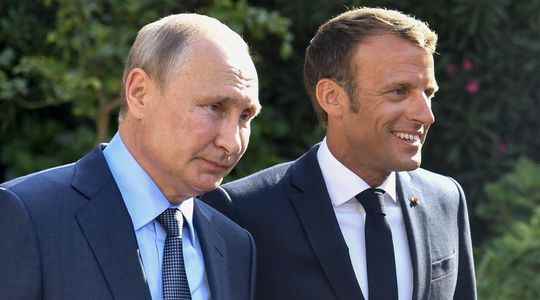At a time when the fear of a Russian invasion of Ukraine monopolizes international attention, Emmanuel Macron is trying to position himself as the arbiter of the conflict. The French president will travel to Moscow on Monday for a one-on-one with Vladimir Putin, before continuing on Tuesday with a meeting with Ukrainian President Volodymyr Zelensky in Kiev. Multiplying initiatives on the diplomatic front since the beginning of the crisis between Russia and Ukraine, the Head of State had already, last Thursday, exchanged on the telephone in turn with his two counterparts, as well as with Joe Biden. , the day before.
“No other European country seems to be able to take the lead on this issue, so France has a card to play, observes Carole Grimaud Potter, founder of the Center for Russia and Eastern Europe Research, based in Geneva. very erased since the arrival of a new coalition in power, and the United Kingdom aligns completely with the American line.
To its allies on the Old Continent who might be worried about a French attempt to go it alone, France, which holds the presidency of the Council of the EU for the first half of the year, took care to specify on Friday that the two meetings planned at the beginning of the week will take place “in coordination” with the rest of the 27. “Our wish by taking this step is that we can properly carry the interest of all our European partners and our allies in the conversation with the President Putin”, we confirm at the Elysée. And this, while the European Union has been relegated to the background of Russian-American discussions in recent weeks.
“What we need to build is a European order based on principles and rules to which we sided and which we acted not against, nor without, but with Russia thirty years ago” , declared the French president before the European Parliament on January 19, during his speech setting his priorities for the next six months.
Firmness and dialogue
In order not to appear complacent vis-à-vis the head of the Kremlin, after the criticisms aroused in certain European countries by the invitation of Vladimir Putin to Fort Brégançon in 2019, the executive wanted to give pledges of firmness from the start of the Russian-Ukrainian crisis.
“Any new attack on the territorial integrity of Ukraine will have massive consequences”, further warned Foreign Minister Jean-Yves Le Drian in an interview at the end of January. JDD. The day before, the French Minister for the Armed Forces, Florence Parly, had meanwhile mentioned the sending of “several hundred” French soldiers to Romania as part of a NATO operation.
The diplomatic route is however following its course, and the French and Russian presidents have spoken to each other five times since December, more than any other European leader. “Throughout his five-year term, Emmanuel Macron’s policy towards Russia has been a mixture of firmness and a call for dialogue. The balance between the different parts of this ‘at the same time’ may have varied in time, but it remained his line of conduct”, underlines Marie Dumoulin, former diplomat and director of the Wider Europe program at the European Council for Foreign Relations (ECFR).
At the end of the last meeting between Macron and Putin, Thursday, the French presidency insisted on the need to “capitalize on the recent positive advances in the Normandy format [rassemblant la France, l’Allemagne, la Russie et l’Ukraine, NDLR] to achieve a lasting solution in the Donbass”, the Kremlin evoking for its part “a constructive dialogue”. The ambition of Paris: that the relaunch of the peace process in the Donbass could constitute a first step towards de-escalation.
“If we make progress within the framework of the Normandy format, it will necessarily contribute to lowering the general tension, even if it will not bring an answer to all the subjects that Russia has put on the table concerning the security architecture. European Union, believes Marie Dumoulin. A breakthrough in this dossier would therefore be useful and would constitute a positive signal for the continuation of discussions between Russia, the United States and NATO.”
